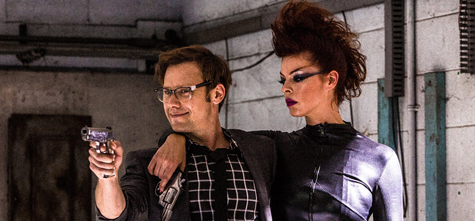
“Nice girlfriend you got there. Got more faces than a diamond.” – Leonard Pine
I sometimes wonder how much being familiar with the novels is coloring how I view the series. Does knowing the general direction of the plot and the character arcs put me at an advantage over viewers who are coming in cold? Did the sudden violence of this episode shock them more than it did me?
But it had to be clear to viewers coming into the series without having read the source material that the real threat to Hap and Leonard was not Howard and his crew. Sure, it has to be scary to have guns held on you by people who clearly are not familiar with how to properly use them, but with the exception of Paco—and to a certain extent, Trudy—Howard’s merry band of revolutionaries have shown themselves to be fools at nearly every turn. Clearly, the real threat comes from Soldier and Angel. Until this episode, the murderous duo had only appeared in one scene per episode, but in that time, they racked up a very bloody body count of three people (assuming that poor bastard in the trunk of the car in Savage Season failed to make it out alive). What they had to do with the main plot has been kept under wraps, but anyone can see that a storyteller does not keep a pair of psychos like that around without having plans for them.
But let’s back up for a minute and talk a little about Trudy. After all, this episode is named after her.
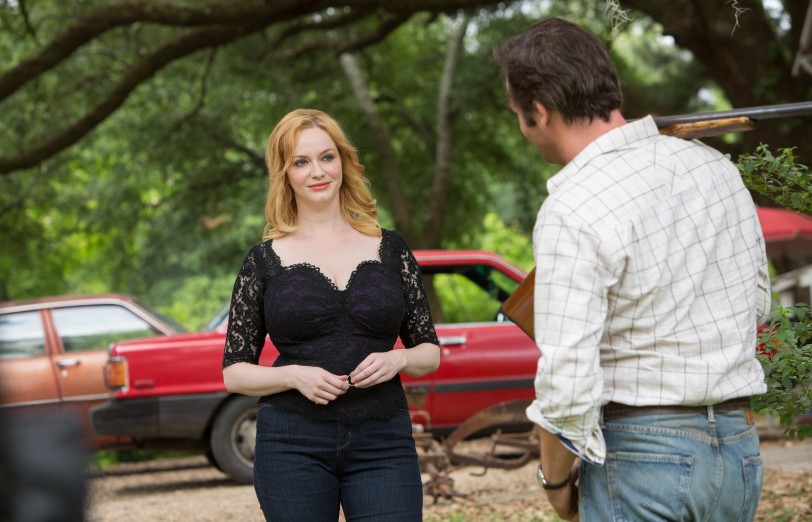
With The Dive, I talked a lot about how much Trudy’s character was changed from the mostly straight up manipulator of the book to a woman who started out manipulating Hap, but found herself compromised when her old feelings for him resurfaced. Still, I was not surprised when she was revealed to be in on the double cross of Hap and Leonard at the beginning of this episode. It is a credit to Hendricks’ performance that she made me believe that Mickle and Damici were possibly going to throw me a curveball with her character arc.
Hendricks certainly brings a fragility and sadness to the choices she makes in Trudy’s flashback scenes. But while Trudy goes between regret, justifying her mostly terrible decisions, and acting with steely—and misplaced—resolve, she never comes to the realization that she is no longer in control of the present-day situation that she helped create. In her mind, her ’60s liberal idealism gives her an identity and a purpose in life. In reality, her refusal to acknowledge that she is hurting people left and right (not to mention, drowning poor, helpless Cheep—a moment that is far more upsetting acted out than it was on the page) has finally bitten her in the ass in a way from which she cannot just walk away.
While Howard remains deluded and still believes himself to be the leader of his little gang, one line changes that perception for the audience as he reminds Trudy what she told him: “The right path isn’t always the easy one.”
It is the same thing she told Hap years before when encouraging him to take prison time by refusing the draft. Hap believed her at the time and was rewarded with two years in Leavenworth, divorce papers, and backbreaking work in a rose field. Howard believes her now and is hellbent to stay the course of their very bad idea.
Of course, what Howard and Hap (And who knows how many other men who were just the right combination of naïve, overly idealistic, and in love with Trudy?) both failed to figure out is that just because the right path isn’t always easy does not mean that the most difficult path is the right one either. Hap learned it the hard way and Howard is about to.
In many ways, Trudy finds a reversal of the dynamic between the three main characters. I talked about “the tug of war between Leonard and Trudy about the best way to “save” Hap” in my look at The Dive. This time around, it’s Hap and Leonard who are trying to save Trudy and the gang from going through with their scatterbrained idea of buying cocaine with the recovered money to fund their causes. Hap points out that drug dealers either end up in prison or dead in a ditch with a bullet in their head. Leonard thinks that latter idea sounds fine for the crew, but does make an argument based on a moral objection to the selling of drugs, telling them they are lying to themselves if they think the drugs are not eventually going to wind up in the hands of kids. His argument is logical—you cannot do a bad thing and expect a good outcome. Perhaps that logic is too straightforward for Howard and his crew of true-believers.
Of course, this episode was not all philosophizing about what constitutes the right and wrong thing to do. Hap and Leonard, despite being largely relegated to supporting characters in this episode, have a couple of great back-and-forth exchanges peppered with one-liners and insults as Leonard lets Hap have it for talking him into a situation where he ends up duct-taped to a glider on his porch. Purefoy and Williams already have the chemistry of a great comedy team and they get to demonstrate it both verbally and physically as director Nick Gomez stages a clever sight gag in their aborted escape attempt.
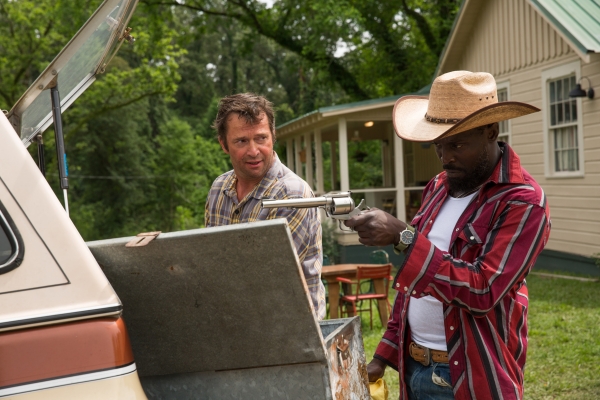
The other major development is the emergence of Soldier, Angel, and Paco as a team. While Paco’s double cross was present in the book, Mickle and Damici make one change to maximize the surprise of this reveal by having Paco be the one to put a bullet in Chub’s head.
Chub was an under-utilized character in the series, but Jeff Pope’s performance struck the right line between funny and pathetic so it was nice to see him get a moment to shine as he stood up to Soldier for calling Leonard a “nigger.” That his reward for practicing what he preached was his sudden death might seem too harsh. But it’s a hard world for the naïve and the weak. No matter how goofy the plotting of a Lansdale story can get, he always keeps the events grounded in reality. You cannot expect to mouth off to a psychopath like Soldier and walk away unscathed. Real world consequences will be the result.
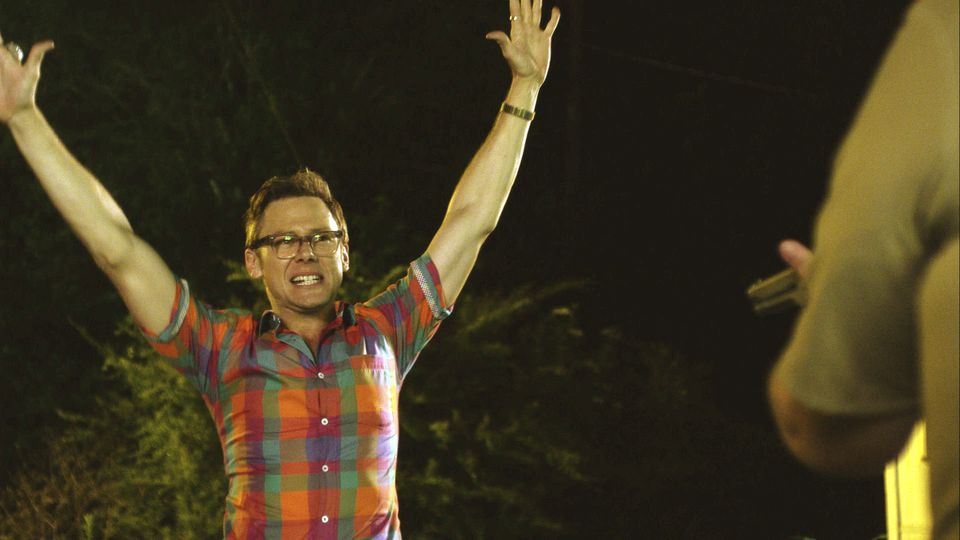
While the first half of the episode was a showcase for Hendricks as she revealed Trudy’s true colors, the second half belonged to Jimmi Simpson. His appearances in the first few episodes always struck a livewire—even if it was Angel who was committing all the ultra-violence. But finally given a little room to run with the character of Soldier, Simpson delivers a pathetic little man whose motor mouth, contempt for Howard and crew, and willingness to kill at a moment’s notice, do not cover up how powerless he would be without a gun and a six-foot tall psychopathic girlfriend built like a linebacker.
Speaking of Angel, it was nice to see a little more of Pollyanna McIntosh this episode. For once, she is not around solely to kill an unlucky, random bit player. Finally speaking, she has fun playing off Simpson’s motor mouth performance, acting as the cockney-accented punctuation to many of his rants.
But as much fun as it was to finally watch Simpson really sink his teeth into his role, the second half of the episode was some of the bleakest material this show has yet approached. From the second Paco executed Chub, there was only dread and ugly violence to follow. From Paco and Soldier killing the two policemen who randomly stopped the van to Trudy’s apparent death wish as she antagonizes Soldier to Howard’s sinking realization that he betrayed his ideals and is paying the price, it was a heavy twenty minutes of television for a show that has never been far from a sarcastic one-liner.
Assuming that the final two episodes stick as closely to Lansdale’s novel as Trudy did, there will be chaos aplenty in the next two weeks. It will be interesting to see if Mickle and Damici are able to handle the tonal shifts in what is ahead as well as they handled this episode.
Hap and Leonard (Season one, episode four: Trudy)
(Airs on Sundance Channel, Wednesday nights at 10:00 pm EST)
— MATT WEDGE.


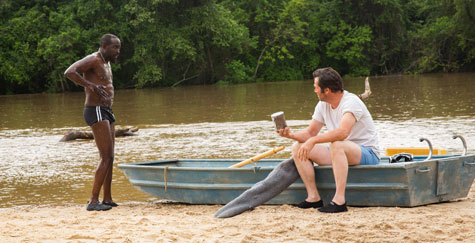
[Episode Three reviewed here!]
Tags: Books, Christina Hendricks, Crime, James Purefoy, Jim Mickle, Joe R. Lansdale, Michael K. Williams, Nick Damici, Pollyanna McIntosh, TV

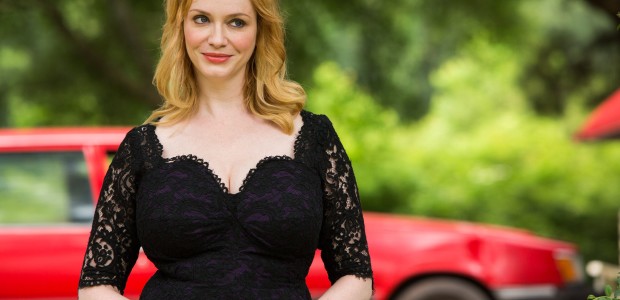
No Comments